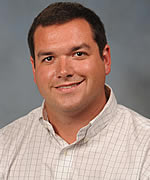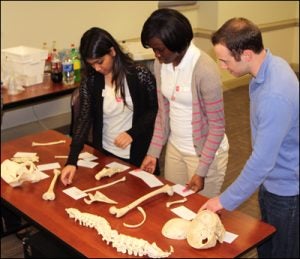STUDENTS SUPPORTING STUDENTS
Medical students lend guidance to aspiring doctors
What started as a class project has turned into a mentoring program involving East Carolina University medical students and local high school and college students.
It’s called the Brody Ambassadors program, and its participants help aspiring medical students hone their academics, choose the best classes to take and get ready to apply for medical school.

ECU medical student Miller Johnstone helped organize the Brody Ambassadors program
“Looking at (medical school) from the outside is a lot different from the inside” for those aiming for a medical degree, said Miller Johnstone, a second-year medical student and one of the organizers of the Brody Ambassadors. “It gives a tangible feel to their goal.”
The group will host a health career fair Saturday, Jan. 12, from 9 a.m. to 1 p.m. in the Brody Commons, the former Laupus Library site. It’s open to high school, community college and college students from Pitt and surrounding counties. Representatives from at least 11 academic programs, including some from ECU and Pitt Community College, will be on hand to talk with attendees.
At the Brody School of Medicine, 60 medical students are involved in the mentoring program. Fifteen second-year students have put together talks that can be delivered to local schools.
Each medical class at ECU takes on a class project. Johnstone, vice president of the class of 2015, wanted to come up with a project that would have some lasting impact. The Ambassadors group was the result.
The group partners with the Pitt County Schools Health Sciences Academy to promote personal health and hygiene, increase health career awareness and interact with younger students who might want to pursue a health career.
Last spring, the Brody Ambassadors held its first program, pairing 30 juniors and seniors from area high schools interested in medicine with 30 first-year medical students. The high school students ate pizza, listened to a medical student panel discussion on medical school admissions, and heard Dr. John Leonard, a neurosurgeon and clinical sciences professor, talk about what it means to be a physician. The students toured the school, spent time in the medical simulation lab and identified human bones as part of an anatomy activity.

Medical student Dylan Suttle, far right, helps local high school students complete a bone identification activity during a mentoring program at the Brody School of Medicine.
Tara Parker, coordinator of the Pitt County Health Sciences Academy, said the Brody Ambassadors program has been “invaluable” for mentoring high school students who are interested in a health career as well as helping convince them they can achieve their goals without leaving home.
“Hopefully, it also is going to help them get over that mindset of ‘I have to get out of Greenville,’” she said.
Adelina Cortez, 17, a senior at South Central High School, said the program helps guide students such as her. She plans to attend ECU in the fall, major in public health and go on to medical school at the Brody School of Medicine.
“You get to talk to actual students who are in medical school,” Cortez said, adding that they encourage her and other health sciences academy students to study hard, make good grades and volunteer in their communities.
“For me to be able to talk to someone who’s in medical school … I really appreciate them taking the time,” she said.
Dylan Suttle, president of the class of 2015, has presented talks on radiology to high school and elementary school students. He worked as a radiologic technologist before entering medical school. As a high schooler, he said, he did some shadowing of a resident physician from Harvard University, but found it a little hard to relate. The Brody program is different.
“It gives (high school) students here a chance to see someone who could potentially be just four or five years ahead of them in their education,” he said.
Another student, Marlana Sheridan, along with two other second-year students, gave a presentation at J.H. Rose High School in which they taught students that differences among people are actually normal. From eye color to skills to medical conditions, it’s common for people not to be alike.
“The presentation was very well-received and the students really began to understand the importance of not defining someone by how they look or problems they face, but to get to know a person for who they really are,” Sheridan said.
The Brody Ambassadors program is funded by class dues and fundraising events.
Dr. James Peden, associate dean for admissions at the medical school, said the initiative of the medical students to create an organization that goes into the community to mentor high school students reflects ECU’s motto of service and the medical school’s goal of educating physicians who want to help locally.
“I’m impressed by our students’ willingness to be a positive force in their community,” he said. “We did not go to them and say ‘Why don’t you do this?’ They came to us and said ‘We want to do this.’”